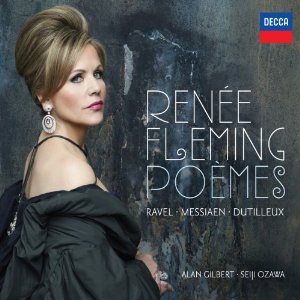Let’s start with some refreshing news: “Poèmes” is the finest thing Renée Fleming has recorded
in many a season. This is not an obvious vanity project. A collection of 20th century French orchestral songs in which Ravel’s “Shéhérazade” is the best-known item is probably a marketing executive’s nightmare, even with a soprano as iconic as Fleming. But the end result is a marvelous showcase for this artist. Along the way, she shines a spotlight on neglected masters deserving of greater recognition.
In short, Fleming sounds sensational here. The basic timbre is astonishingly well-preserved for a soprano in late career. The material also draws out Fleming’s special affinity for this repertoire. In the liner notes, she states: “For the sheer sensual joy of singing, no language gives me more pleasure than French. Not only am I drawn in by the beauty of the poetry and the evocative texture of the music, but the unaccented and legato fluidity of these phrases places my voice in its optimal resonance.” She exudes the same voluptuousness and vocal glamour that made her Manon and Thais so special in the theater–minus the heaping dollop of mannerisms.
In fact, Fleming is surprisingly restrained in her approach to interpretation. There is the occasional and expected Leontynesque grunt and swell on low notes but in general, Fleming sounds fully within the material and singing with an organic command and appreciation for the demands of the music. One even detects a note of Schwarzkopfian parody in the phrase “comme une musique fausse” from the third song of the Ravel song cycle, where she sounds the final word with an almost self-deprecating textual emphasis.
While “Shéhérazade” is the best known item on the program, it is the most dispensable of the offerings. Fleming sounds vocally attractive and dramatically alert throughout. But she is really undone by a most unflattering recording acoustic, a problem that also afflicts the Messiaen songs. Fleming sounds as if she is singing underwater from within a metal cylinder with the orchestra piped in from regions unknown. This automatically disqualifies her recording from ultimate consideration. No need to dispense with your definitive Crespin recording in gorgeous early-stereo Decca sound. Actually, the current recording is so offensive in this regard, feel free to hang on to your Heather Harper.
It is to Fleming’s credit that she transcends her very real sonic limitations to score a triumph in Messiaen’s “Poèmes pour Mi,” a collection of songs celebrating the composer’s short-lived happiness in marriage to the woman he nicknamed “Mi.” Her formidable technique and fluent musicianship make the cerebral, sometimes angular, always demanding songs a powerful listening experience. She is required to execute many melismas throughout the piece and they are impeccably delivered with easy breath control, ravishing tone and dead-on-the money intonation, no more so than in the opening song “Action de grâces.” She receives considerate support throughout by Alan Gilbert and the forces of the Orchestre Philharmonique de Radio France.
“Le Temps l’horloge” is a work commissioned especially for Fleming from Henri Dutilleux, who is 96 at the time of this review. Fleming states in the liner notes that the two met at a radio station while waiting to be interviewed and shared their mutual appreciation. The piece is captured here in a live 2009 performance at the Theatre des Champs-Elysees, unfortunately recorded in the same soupy resonance as the rest of the disc. Dutilleux’s subtle use of harpsichord, accordion and various percussion instruments is almost completely obliterated by the flat, distant placement. Fleming gets carried away in the parlando sections of “Le Masque,” emoting to beat the band but is persuasive elsewhere. Seiji Ozawa is a sensitive collaborator and the Orchestre National de France sounds like a superb ensemble. Too bad they are both undercut by the poor, almost in-house level of the recording.
For the sake of Fleming’s masterful rendering of the Messiaen, I highly recommend this disc. It is a vindication of her current possibilities as an artist and an affirmation of her considerable strengths. But note to Decca: please destroy any pending contracts with these recording engineers and sample your own remarkable archive for guidance on how it’s done.




